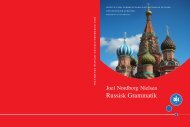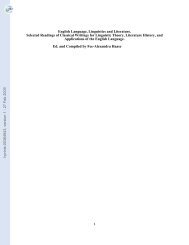[hprints-00683151, v2] Enea Silvio Piccolomini (Pius II ... - Hprints.org
[hprints-00683151, v2] Enea Silvio Piccolomini (Pius II ... - Hprints.org
[hprints-00683151, v2] Enea Silvio Piccolomini (Pius II ... - Hprints.org
Create successful ePaper yourself
Turn your PDF publications into a flip-book with our unique Google optimized e-Paper software.
<strong>hprints</strong>-<strong>00683151</strong>, version 2 - 19 Mar 2013<br />
It was given by <strong>Piccolomini</strong> at a general session of the council in 1436 9 , see below.<br />
Later, in 1450, <strong>Piccolomini</strong> in his Revised History of the Council wrote about the<br />
speech: Since we bore sorely the injury to the duke whom we saw disdained because<br />
of this 10 , although we had little eloquence, we wished to make up for the negligence<br />
of the man and honor so great a duke. Rising, therefore, in his place a few days later,<br />
we delivered an oration in praise of Pavia and the Duke of Milan which was heard for<br />
two hours without any annoyance, without inflicting injury on anyone. 11<br />
And still later in his life, as <strong>Pius</strong> <strong>II</strong>, he wrote about the speech in his Commentaries:<br />
At the time, there was some discussion of transferring the council to a place where<br />
the Greeks would come for a conference. The choice fell between four cities willing to<br />
pay the expenses of the Greeks: Florence, Udine, Pavia and Avignon. Eloquent<br />
speeches in praise of these cities resounded through the great hall; only Pavia had no<br />
one to plead its cause, because Isidoro Rosati, whom the Duke Filippo Maria of Milan<br />
had sent for that purpose, had spoken so badly and stupidly that he had been told to<br />
hold his tongue. Aeneas was moved by the humiliation of this noble city and its<br />
prince, and that very night he composed a speech. Next day he went into the council,<br />
where Giuliano, the papal legate, used his influence to get him permission to speak.<br />
For two hours he declaimed before a most attentive and admiring audience.<br />
Afterwards, everyone who had heard his speech had a copy made for himself. 12<br />
Note that in 1450 he wrote “a few days later” and ten years after the “next day”.<br />
Ge<strong>org</strong> Voigt, <strong>Piccolomini</strong>’s first – and not very sympathetic – biographer, said about<br />
the speech: Die Rede, die <strong>Enea</strong> nun vor dem Concil hielt, ist uns als das erste von ihm<br />
ausgehende Zeugnis seiner Fähigkeit und Gewandtheit wichtig. 13 And later: Wer sich<br />
an alle Parteien wendet, wird seiner Sache keinem Freund, aber auch seiner Person<br />
keinen Feind erwerben. An der Wahl von Pavia lag dem Redner weniger als an der<br />
Gunst des Herzogs, für den er sich aus freien Stücken verwendet, und an der hohen<br />
9<br />
Cf. Helmrath: Reichstagsreden, p. 141<br />
10<br />
I.e. by an inept speech of Isidoro da Rosate<br />
11<br />
<strong>Pius</strong> <strong>II</strong>: Revised, p. 349<br />
12<br />
<strong>Pius</strong> <strong>II</strong>: Commentaries, p. 32-33<br />
13 Voigt, p. 117<br />
15


![[hprints-00683151, v2] Enea Silvio Piccolomini (Pius II ... - Hprints.org](https://img.yumpu.com/16048892/15/500x640/hprints-00683151-v2-enea-silvio-piccolomini-pius-ii-hprintsorg.jpg)
![[hprints-00284881, v1] Musik i gymnasiet](https://img.yumpu.com/17715560/1/190x245/hprints-00284881-v1-musik-i-gymnasiet.jpg?quality=85)

